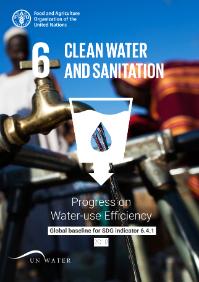Progress on water use efficiency - Global baseline for SDG 6 Indicator 6.4.1
Resource information
Date of publication
Noviembre 2018
Resource Language
ISBN / Resource ID
FAODOCREP:CA1588EN
Pages
6o
License of the resource
Copyright details
© FAO. FAO is committed to making its content freely available and encourages the use, reproduction and dissemination of the text, multimedia and data presented. Except where otherwise indicated, content may be copied, printed and downloaded for private study, research and teaching purposes, and for use in non-commercial products or services, provided that appropriate acknowledgement of FAO as the source and copyright holder is given and that FAO's endorsement of users' views, products or services is not stated or implied in any way.
Access to safe water and sanitation and sound management of freshwater ecosystems are at the very core of sustainable development. This is the aim of Sustainable Development Goal 6 (SDG 6), which includes approaches to water management supported by international cooperation, capacity building and stakeholder participation.
Indicator 6.4.1 has been designed to assess the economic and social use of water resources in terms of the value added when they are used in different sectors of the economy. Water-use efficiency is strongly influenced by a country’s economic structure, the proportion of water intensive sectors and any “real” improvements or deteriorations.Increasing water-use efficiency over time means decoupling economic growth from water use across the main water-using sectors, which are agriculture, industry, energy and municipal water supply.This report describes the methodology for the assessment of SDG indicator 6.4.1 on water use efficiency, illustrating its development in the pilot phase of the GEMI project and the technical steps needed to apply it. It passes to present the data collection process, and the role of the various national and international stakeholders in the monitoring process. Finally, the report shows the results of the first implementation of the indicator, defining its baseline and proposing key messages for the interpretation of the results.

